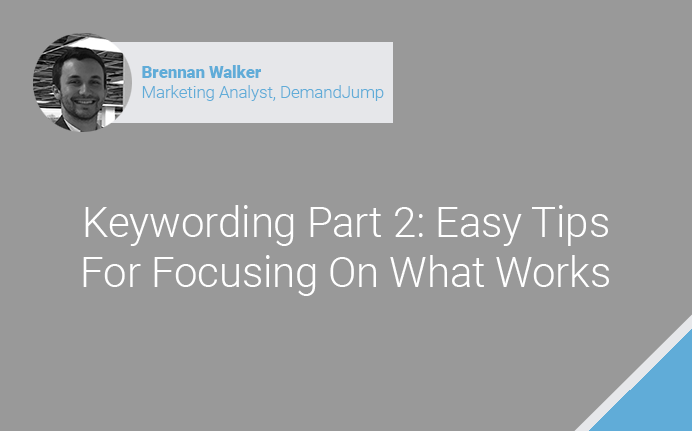Keywording part 2: easy tips for focusing on what works
July 14, 2016 •Brennan Walker

Keywording is an important aspect of any strong content marketing strategy. Here at DemandJump, Brennan Walker, Marketing Analyst and Head Client Success Manager, frequently gets called upon to help clients build out these strategies and keyword lists.
In part 1 of this series, Brennan talked about generating a large list of potential keywords. In part 2 he discusses how to cut that list down, and focus on keywords that can really move the needle in terms of paid or organic search.
Using a variety of tools, including DemandJump’s AIM platform, Google Adwords, and Moz, Brennan is able to build highly targeted, highly relevant lists of keywords.
He recommends using two main data points from Google Keywords Planner to analyze the value of any given keyword:
- Competition Score: This metric is listed as a value between 0-1, 1 being the most competitive and 0 being not very competitive. Competition score shows just how competitive each keyword is in the Google Adwords marketplace. Higher scores signify a more difficult keyword to win (or more expensive keyword in the case of Adwords).
- Average Monthly Searches: This metric is quite literally as it sounds—the average number of monthly searches on Google for any given keyword. Higher search numbers means that more people are interested in the topic.
How to use these metrics: To find the best keywords to target, look for ones with a low competition score, and a high number of average monthly searches. This will provide you with the highest visibility in a crowded and competitive game of traffic.
Tip from Brennan: In general, look for keywords with a competition score less than .6 and more than 8,000 average monthly searches. However, keep in mind that your company, industry, competition, content type, and goals all need to be factored in when considering what keywords to target. Don’t get hung up on averages or advice from a few sources. Everyone is different, so be sure to test, analyze, iterate and repeat.
Using competition score and average monthly searches can cut a list of potential keywords down from 800 to about 70-80. This is a much easier number to work with, and will help focus your keyword strategy.
To conclude part 2, Brennan suggests loading you new list of 70-80 into Moz’s keyword tool. Remember that, while useful, Google's Keyword Planner was designed to be used with paid keywords. Moz’s tool will help pick out which words are targetable for an organic campaign.
Continue to refine your list and work on keywords that will give your brand the most visibility possible. And be sure to tune in next week when Brennan talks about competition.
Transcription
Begin Transcription
Step two is really trying to cut down that list of 800 keywords that Keyword Planner provides. Most people don't really know that the Adwords Keyword Tool is more specific to paid search rather than organic search, but it still provides really good insight as to search trends as a whole to the ecosystem. It definitely pushes you in the right direction with that list of 800, it definitely gets some sparks going.
Once I have that list of 800 and I’ve exported it into an Excel spreadsheet, I then analyze two main data points.
One is the competition score. Keyword Planner provides a competition score between 0 and 1—1 being the most competitive and 0 being not very competitive.
I also analyze the average monthly searches, so with something that has 100,000 monthly searches versus 500 monthly searches, the 100000 one is going to be a lot more important.
What I do is I try to find the sweet spot between things that have low competition score generally .6 or lower, and then things that have high monthly search trends, or high average monthly searches.
Then say, “Alright, something might have 10,000 monthly searches, which is great, but only have a .3 competition score. That is something that turns on a flag for me and turns on a light to say, “Hey, I should be focusing on that.”
Identifying those specific keywords based on on those metrics of lower competition score and high average monthly searches really cuts down a list from 800 to 70-100.
From there, I'm able to load up those keywords into SEO Moz, which is a great tool to analyze the organic value of those keywords. That will be able to tell us if we are already ranking for some of those keywords right now, organically, and checking to see if something isn’t already resonating within the market.
Because, again, that waves a flag for me to say, “This is already resonating within our market. We should continue to pummel that topic with blogs and content, and so on and so forth.”
Generally it takes a little bit of time for those keywords to run, and after that I hop into specific competitive keywords.
End of transcription
Featured Articles
Categories
- Attribution Tracking (13)
- Channel Optimization (11)
- Consumer Insights (68)
- Content Marketing (251)
- Data Science (8)
- Digital Marketing (6)
- Digital Transformation (26)
- Enterprise (10)
- Lead Generation (14)
- Market Intelligence (8)
- Marketing Analytics (39)
- Marketing Attribution (57)
- Marketing Management (153)
- Marketing Operations (86)
- Organic Search (222)
- Paid Search (52)
- Pillar-Based Marketing (63)
- Programmatic Advertising (9)
- SaaS Content (14)
- SaaS Marketing (29)
- Search Marketing (111)
- SEO Keyword Research (28)
- SEO Pillar (18)
- SEO Strategy (46)
- SMB (5)
- Website Content (12)


